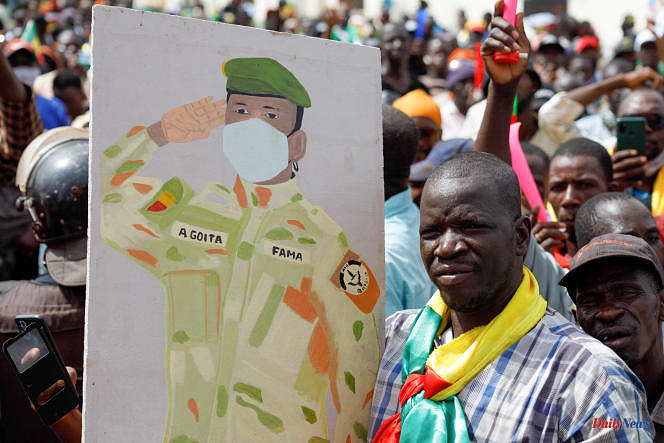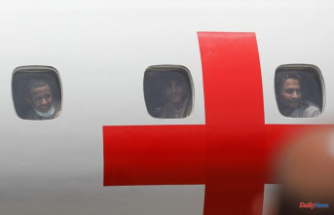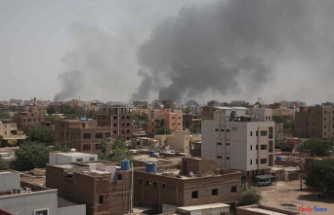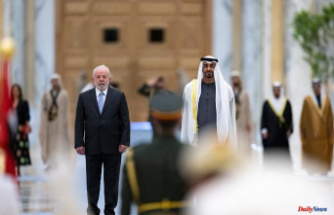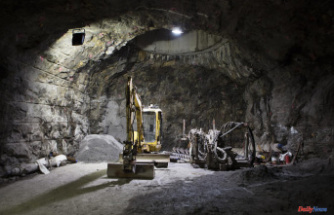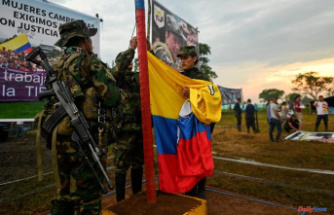It was an open secret, as the delays had accumulated since the junta came to power in Mali. On Friday, March 10, Colonel Abdoulaye Maïga, government spokesperson, announced in a press release that the referendum on the new draft Constitution, the first of many meetings at the polls planned by the authorities, will not take place as scheduled for March 19. "A slight postponement" necessary to better organize the consultation at the local level and popularize the text with the people, tried to reassure the minister, without announcing a new deadline.
“It is therefore to be feared that the transition will be extended,” concluded the Framework of Political Parties and Groupings for the Return to Constitutional Order the same day. For this coalition, as for other actors and observers of the Malian electoral process, the postponement of the constitutional referendum symbolizes the lack of will of the putschists (who came to power following two coups d'etat, in August 2020 and May 2021) to advance the major reform project announced, supposed to lead to the end of the military transition by the return to power of civilians during elections in February 2024.
Constitutional referendum, organization of six elections (from municipal to presidential level), territorial reform, revision of the law and electoral processes... The program of "refounding the Malian state" promised to the people must be completed in less than a year. "It's impossible," retorts Amadou Koïta. For the spokesman of the Framework of the parties, the authorities have "multiplied the reforms by conditioning the realization of some to the holding of the elections, in order to play the clock".
A widely contested draft constitution
Scheduled for February, the convening of the electoral college for the constitutional referendum has not yet taken place. At issue: the introduction by the junta of a revision of the electoral law. The content of the latter, adopted but not yet promulgated, remains unknown to most political actors for the time being. As for the Independent Election Management Authority (AIGE), the key body responsible for organizing all the elections and referendums, it should have been set up in the summer of 2022 but was only formalized in January. 2023; in the local constituencies, its representations are still not installed.
"The new referendum date will be set after consultation with the AIGE and all the actors in the electoral process", promised Colonel Maïga. But the draft Constitution, validated on Wednesday March 15 by the President, Colonel Assimi Goïta, is contested by a large section of civil society and the political class. Critics also stand up against the very composition of the AIGE, which, according to several of them, would only be independent in name.
“It is an institution committed to the cause of the military, notes Ibrahima Sangho, president of the Observatory for elections and good governance in Mali. The president appointed ten of the fifteen members instead of the three provided for by law. The other seven should have been chosen by civil society and the parties. Like him, political scientist Kalilou Sidibé denounces the junta's attempts to "keep control over future elections":
“They militarized the representatives of the territorial administration. Almost all governors are senior officers. However, they are important players in the management of elections. »
Before the February 2024 presidential election, Bamako must organize in three months the coupled elections of municipal, circle, regional and district councillors, as well as legislative elections at the end of October. Here again, many observers consider this timetable untenable in view of the territorial reform adopted in February but which still needs to be applied on the ground. Initiated by Bamako to meet the decentralization requirements posed by the Algiers peace agreement (signed in 2015 between the former independence rebel groups in the north and the State), the reform notably creates 99 new circles (the equivalent of departments) that must be operationalized before any local elections can be envisaged.
Struggle with the international community
Other prerequisites for the elections: the revision of the electoral register and the distribution of biometric voter cards, a requirement formulated by the electoral law of June. "The process must end on March 31, but today less than 5% of Malians have obtained their new card," says Amadou Koïta. For the authorities, reaching citizens in the bush in a country the size of a quarter of the European Union and confronted since 2012 with the inexorable expansion of jihadist groups having today "invaded 80% of the territory", according to the government, raises puzzle.
But if the difficulties facing the authorities are real, "we do not feel a clear will to organize these elections", estimates the political scientist Kalilou Sidibé, fearing that the soldiers will seek to drag on in power.
The date of the return to civilian affairs is the subject of a bitter showdown with the international community. After the first coup, the junta initially sought to stay in power for three years, before backing down in the face of international pressure and being granted a year and a half. Then the second coup happened and "as appetite comes with eating, they tried to negotiate five more years, to finally get two", slips a Malian politician: "It is indicative of their intentions. »
In February 2022, Prime Minister Choguel Maïga had delivered to the press his point of view on the very concept of democracy: “The election is not an end in itself. Democracy cannot take precedence over the lives of citizens, over their security. A year later, on February 14, the leak on social networks of an audio recording attributed to Amadou Ousmane Touré, the president of the Constitutional Court, confirmed the doubts of the political class about the will of the junta to organize elections. We hear a man's voice saying that the conditions are not met:
“I tell you clearly: we have nothing to go to the elections. If it's tomorrow, we're not ready. And even in a few months, we won't be. »
According to our information, less than a year from the presidential election, the Constitutional Court, a key body in the electoral process responsible in particular for validating and publishing the results, has still not been provided with a real budget of functioning.

